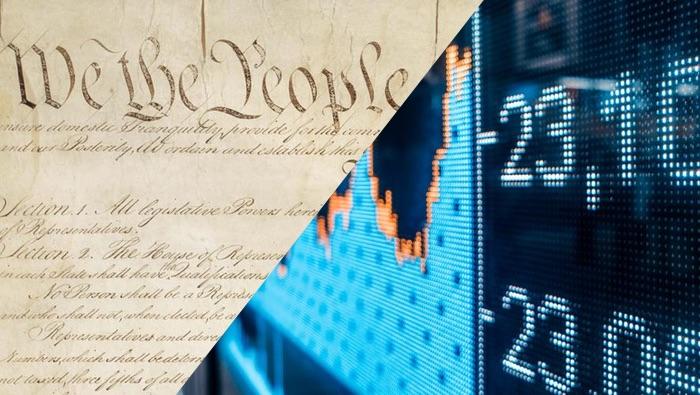Law School Launches Constitutional Law Institute, Center on Law and Finance
Two New Research Centers Foster Dialogue, Research, and Thought Leadership

The University of Chicago Law School has launched two new research centers designed to bring a deep focus to both law and finance and constitutional law, two areas of great importance to legal scholars and practitioners.
The Center on Law and Finance is directed by Professor Anthony Casey, a leading scholar of corporate reorganization, corporate governance, and financial regulation. The interdisciplinary initiative will bring academics and practitioners together through conferences, workshops, and other events to explore a fast-changing field that grapples increasingly with complex issues around investor activism, venture capital restructuring, distressed investments, valuation disputes, and more.
The Constitutional Law Institute is directed by Professor William Baude, a leading scholar of constitutional law and interpretation. In addition to advancing and sharing scholarship related to constitutional law, the institute will create spaces for respectful debate on difficult topics and convene leading academics to examine longstanding constitutional issues that impact American society. Its inaugural initiatives include a podcast, Dissenting Opinions, that debuted this spring. Hosted by Baude, each episode of the first season features top legal minds discussing a Supreme Court case that believe is misunderstood. In several "deep dive" episodes, Baude and Professor Adam Chilton discuss originalism.
“As leading thinkers in their respective fields, Professor Casey and Professor Baude bring tremendous knowledge, intellect, and passion to their work, and these new centers are well-poised to generate field-defining ideas and deep engagement with practitioners in two important areas of law,” said Dean Thomas J. Miles, the Clifton R. Musser Professor of Law and Economics. “Both the Center on Law and Finance and the Constitutional Law Institute are dedicated to rigorous inquiry and the robust exchange of ideas, values we hold dear at the Law School. We are exceptionally grateful to the donors whose generosity made these initiatives possible.”
The Center on Law and Finance began its work in 2019 with a mission built around connecting top thinkers—academics from multiple disciplines and institutions, top practitioners, and students—to better understand how the law interacts with, and shapes, financial institutions. The goal, Casey said, is to foster dialogue aimed at translating cutting-edge research into practical applications and to create a hub for intellectual leadership on these issues.
“As financial markets become more sophisticated and complex, legal analysis of those markets must keep up. This requires the innovative research and rigorous examination that the University of Chicago is known for,” said Casey, who is also the Law School’s deputy dean. “The Center will take advantage of the Law School’s tradition of interdisciplinary study and creative research to tackle this endeavor.”
Before the COVID-19 pandemic took hold, the Center on Law and Finance had planned to bring together dozens of lawyers, scholars, finance professionals, bankruptcy judges, and the chief justice of the Delaware Supreme Court in March 2020 for an inaugural conference to discuss how judges should value assets in merger appraisals, bankruptcy proceedings, and the litigation of financial transactions. That will be held in the future.
In the fall of 2020, the center hosted three virtual events, including a September stakeholder governance workshop, “Can Business Law Do More to Advance Social Goals?”, which featured scholarship by the Earl B. Dickerson Fellow Emilie Aguirre and Harry A. Bigelow Fellow Aneil Kovvali and drew at least 45 attendees. The center also held an August webinar on course selection for students interested in business law careers and a private virtual event in late October for its Founders Committee.
The Constitutional Law Institute launched this quarter with a September 17 Constitution Day Conversation on constitutional interpretation. The virtual event featured a lively discussion among Baude; Professor Farah Peterson, a legal historian who joined the Law School’s faculty on July 1; and Stephen Sachs, a professor at Duke Law School.
The institute is particularly committed to free speech, and is focused on creating opportunities for vigorous engagement on challenging topics. The institute will take a nonpartisan, academic approach by promoting deep analysis and centering its work on longstanding constitutional questions rather that responding to recent political questions.
“Our hope is to contribute to scholarly rigor and to help spread the best ideas in constitutional law,” Baude said. “In the long run, that is what constitutional law needs most.”
In addition to hosting events, activities, and visitors, the Constitutional Law Institute will focus on disseminating Law School scholarship on constitutional issues. The first of its podcasts is expected to debut in early 2021.
“The University of Chicago Law School is an outstanding place for constitutional law,” Baude said. “I'd like its contributions to this field to be as prominently known as its contributions to law and economics.”